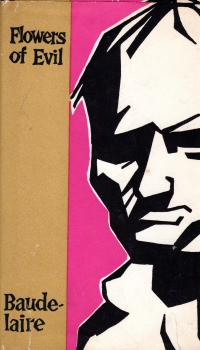 Interspersed among my other reading, I’ve been working on this book for a little bit. It’s a collection of poems by Charles Baudelaire, but they’re end-rhymed, so the translator had a heavy hand in the actual English of the poems which probably means they’re almost as much his work as Baudelaire’s. Because poems have so much nuance, rhythm, and flow that rely on word selection, you have two choices when translating: You can go with the literal translation, which will chop most of the mouthfeel of the original poem out, or you can try to put the poem in the target language with as much of the flavor of the original as possible but still ending up with something of the original in it. I think this translation, as demonstrated by the end lines, did more of the latter.
Interspersed among my other reading, I’ve been working on this book for a little bit. It’s a collection of poems by Charles Baudelaire, but they’re end-rhymed, so the translator had a heavy hand in the actual English of the poems which probably means they’re almost as much his work as Baudelaire’s. Because poems have so much nuance, rhythm, and flow that rely on word selection, you have two choices when translating: You can go with the literal translation, which will chop most of the mouthfeel of the original poem out, or you can try to put the poem in the target language with as much of the flavor of the original as possible but still ending up with something of the original in it. I think this translation, as demonstrated by the end lines, did more of the latter.
Now, about the poems: Oh, my.
On one hand, these are the poems I wanted to write when I was twenty years old. Vivid, evocative, concrete, and meaningful (and full of end rhymes). You’re in the moment with the poet narrator in a way that overshadows a lot of poetry in English that I’ve read. The topics are full of love, lust, and pondering mortality.
But.
The introduction explains a bit of Baudelaire’s bio and explains his obsession with a particular woman, and it comes through in the poems as the poet-narrator fixates on a woman and the poems describe a love/lust/hate relationship with a woman. And the poet-narrator muses on death and the ultimate meaninglessness of love when confronted by death. It’s pretty powerful stuff.
And vivid in a sometimes squicky way. There’s a poem called “Carrion” which is about the poet-narrator and his love out for a walk when they come across a dead animal, and the poet-narrator describes it in great detail as it breaks down and then says something about the breakdown of the flesh and how the woman will be food for worms soon. And then there’s a poem about necrophilia. But only one.
So.
It’s good poetry qua, but some of the topic matter is a bit objectionable.
This book features an inscription, To Michael, with love and a Merry Christmas, Ellen 1966. Frankly, I’m not sure what sort of message you’re sending if you’re giving this book to a lover. Also, Phil offers to read Baudelaire to Rita in the film Groundhog Day; suddenly, this changes the meaning of the film for me forever.
Books mentioned in this review:


